BY ELLERY SHEA ’25
On April 22nd and 23rd, Skidmore Theater took the triangular stage of the Tang Teaching Museum’s current exhibit a field of bloom and hum to present a staged reading of visiting playwright Genevieve Simon’s new work, Hell is Real. Directed and dramaturged by visiting artist M Sloth Levine, Hell is Real is a queer horror dramedy which explores queerness, horror, and power. It follows the stories of several people who are all experiencing some kind of transition – new manager Nate is trying to keep his family’s haunted house attraction, the Fields of Hell, afloat following his father’s unexpected passing; longtime employee Joan has suddenly decided to try on a new role; Teeny and Franny, dedicated scare-partners and “terror tots” are broken up when Teeny gets an unexpected promotion; Curtis, a former middle-school teacher from Brooklyn who has recently returned to Ohio decides to get a job at the Fields of Hell; The Girl, who may not have the language or permission to be who she truly is, explores her identity by going to the Fields; and through all of this, the Midwest Moms who have forever cloaked themselves in Midwest niceties are becoming much more overtly threatening…
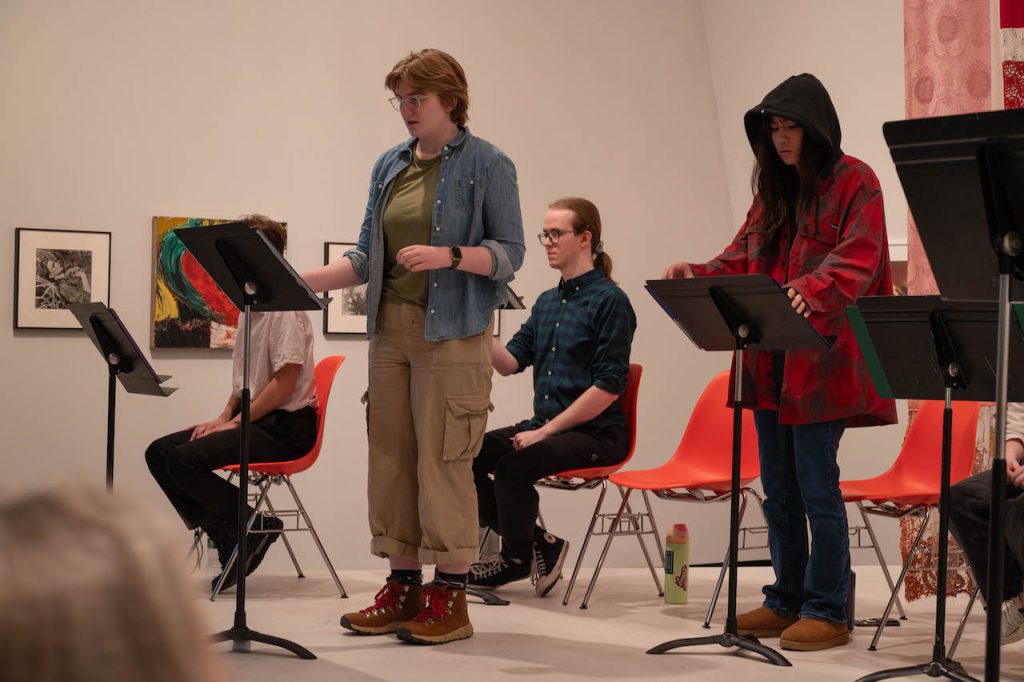
The opening moments of Hell is Real immediately root us in the play’s setting: rural Haskins Ohio, where the wind rustles the corn and high heeled footsteps crunch in gravel. The Stage Directions (read by Finn Krol ’27), like many other parts of the script, bleed with equal parts personality and poeticism. And just after a sliver of worldly context, audiences are met with banging, screaming, shouting, thudding, yelping, scurrying, panting, and silence from the actors onstage. Like the thrill of a rollercoaster careening over its first drop, these sudden sounds launch audiences right into the action.
In the Kitchen of the Fields of Hell Haunted House Attraction, fifteen-year-old terror tots Teeny (Theo Leff ’28) and Franny (Sophie Kelly ’25) work yet another shift at their part-time job. Donning their most intimidating “monster voices,” they strive to spook anyone who enters their domain. On this particular night, The Girl (Landon Weber ’25) decides to pay the tots a visit. The Girl, who is dressed like a teenage boy because they do not yet know they are a trans girl, gets playfully taunted by Teeny, who asks The Girl if she wants to be made into her “favorite little girl.” Teeny gleefully threatens to put the Girl in a beautiful skirt, give her a nice pair of heels, and take her shopping at the mall – ideas which are, of course, nothing short of euphoric to The Girl. In this way, the Fields of Hell offers a place of refuge and escapism not only for its employees, but for visitors too.
This interaction is going as humorously as ever, until Franny interrupts them by emerging from inside the fridge and booming “YOU SMELL DIFFERENT WHEN YOU’RE AWAKE!” After scaring the girl off with this jumpscare, Teeny expresses their annoyance at Franny for ending the conversation they were having with their guest. Franny then begins to tease Teeny for their apparent crush on The Girl. Teeny, who would clearly do anything to prove their dedication to the haunted house, defends their attraction by claiming that they’re just doing their job. They remain convinced that their haunted house elders Nate (Emile Sventveld ’28) and Joan (Jude Gwak ’28) are never going to see them as their peers unless they up their game.
Meanwhile, Nate is consumed with grief and work in the tomb of his father’s office. Surrounded by a visually cluttered room packed with doodads, paperwork, trinkets, and memorabilia, he is disheveled and struggling to manage all that is expected of him — especially picking up his phone which won’t stop ringing. His overwhelming circumstances are put on pause when Joan enters, insistent that she would like to try the role of Rufus (the Literal Devil, or in the words of the tots, “Demon Daddy”), even though she has always killed the role of Evangeline. When Nate reveals that he has already held auditions and cast the role of Rufus, Joan is not only devastated, but accountable for training the new hire.
A true Evangeline, this doesn’t stop Joan from going into her next shift with a one-track-mind. After discovering that Nate is not on-site that day, Joan enters the dressing room, occupied by the Terror Tots as they prepare their makeup for their shift. Impressed by Teeny’s wound work, Joan promotes Teeny to be the new Evangeline and appoints herself Rufus, leaving new hire Curtis (Lucas Falick ’25) with the role of Franny’s fellow terror tot.
Out in the cornfields, Nate is barraged by a PTA Mom (Sofia Fenner ’25, and also note that all of the mom roles are to be played by the same actor) who won’t stop talking about how tragic and terrible his father’s death was. After she mysteriously departs, Nate remains in the field, grief stricken, until Joan interrupts. Joan offers to comfort Nate by coaxing him to change the car plates as if she were his Dad, as per Nate’s request. In this moment, we observe that roleplay isn’t just necessary for the children – it’s also a part of Nate’s grief process. In Hell is Real, roleplay takes on the meaning of granting power to people whose circumstances have denied it to them: it’s not only important for Teeny and The Girl, whose youth denies them power, but also for the adults, whose adult responsibilities deny them full autonomy.
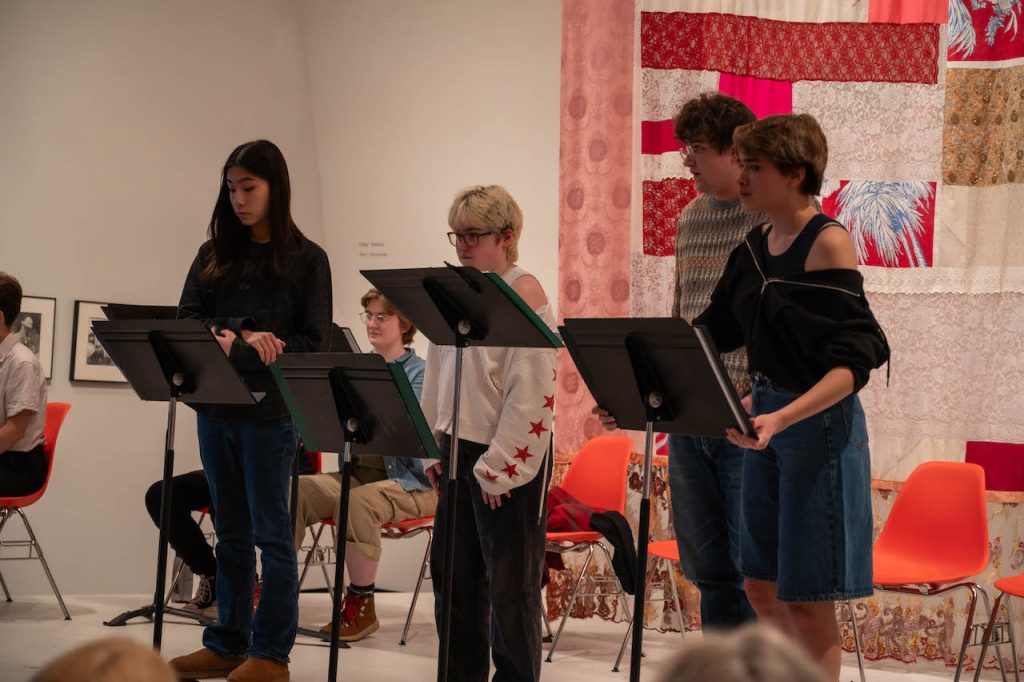
During this interaction, we also learn a little bit more about Curtis, who went to high school with Nate and Joan, moved to Brooklyn where he taught as a middle-school teacher for a while, and recently returned to Ohio. Nate and Joan’s conversation alludes to the sort of imperfect person Curtis was in high school. “People can change,” Nate says, adding that Curtis attended the funeral. Before they part ways, Joan suggests to Nate that they tell the kids about how the Fields of Hell is “more than just a name,” alluding to the fact that there is a portal to hell beneath them and “someone has sprung the leak.”
Back in the kitchen, Curtis and Franny get to know each other in-between scares during their terror tot shift. Despite Franny’s obvious dismay at Teeny’s promotion, they quickly form a bond with Curtis. During this sequence of scaring and conversation, the actors’ performances make it abundantly clear just how much fun it is to speak in a “monster voice” on stage and pretend to scare people. The quick pacing of Simon’s perfected dialogue switching keeps the scene flowing seamlessly. During the scene, Curtis confesses his biggest flaw, that he “doesn’t know how to keep friends,” which prompts Franny to share one of their biggest secrets (on the condition that Curtis says nothing and tells no one) – that they’ve hidden a body in the basement.
It’s not just any body though: it’s the body of Teeny’s mom, Barbara Barnes, a prominently outspoken conservative senator. Teeny, who is liberated to identify as non-binary while working at the haunted house, is evidently not awarded the same privileges at home. Now, after falling down the stairs into the basement of the haunted house, Teeny’s mom is becoming inhuman, melting into goo, and hatching things inside of herself. Despite Franny’s best efforts to conceal Teeny’s mom as part of the attraction, her appearance is beginning to progress in ways that are unconcealable, and Curtis thinks that someone needs to be told.
Out in the fields once more, Nate bumps into a woman who he collaborated with on a project in high school, and she begins to flirt with him. Eventually they kiss, and while that happens, it’s as if she’s sucking something out of his body, and there is a high pitched noise. “There is something we need from you,” she tells Nate. It isn’t until Joan once again arrives to the rescue that Nate escapes the situation.
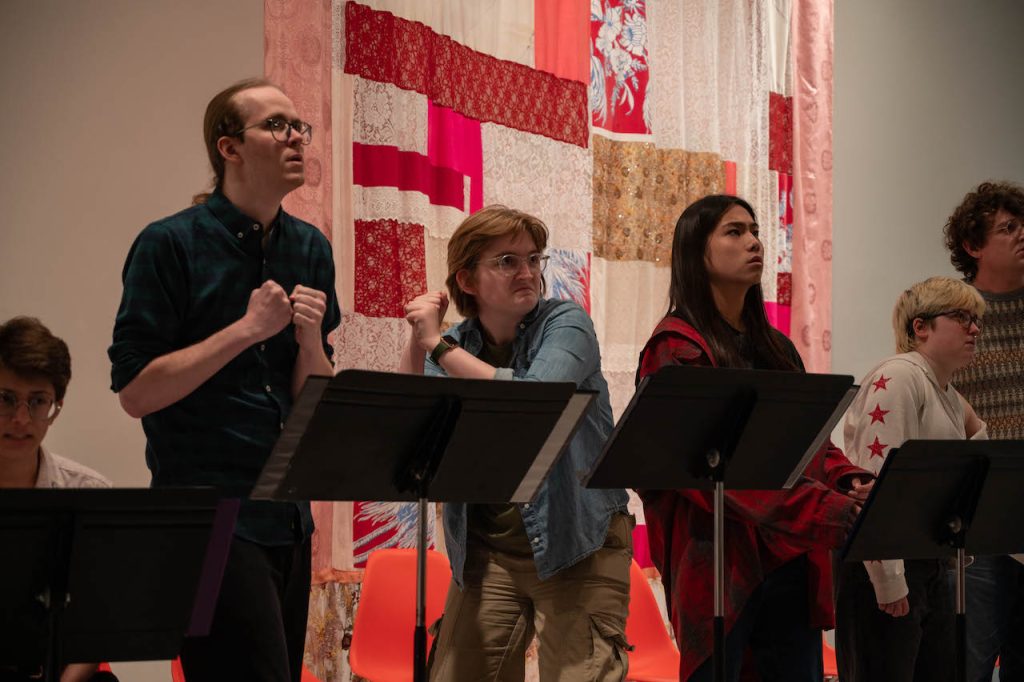
As one of Teeny’s Evangeline shifts nears its end, The Girl returns. Though she was initially concerned that Teeny had been fired when she didn’t see them in the terror tot room, she is greatly relieved to see that they have been promoted. However, Teeny’s promotion poses a new problem: now that there might be more attention on them, they are afraid to continue giving the girl special attention through roleplay during their shifts. After The Girl pleads for Teeny to indulge them because they really need it tonight, the two drop into roleplay. Though Teeny’s performance as Evangeline has much room for improvement, The Girl is put at ease by Evangeline calling her their little girl. This momentary euphoria is put on hold by the sudden vibration of the house.
As soon as Teeny hears someone coming, they hide The Girl in the closet (a comically ironic place to be putting someone who is still in the process of discovering their gender identity). Nate enters Evangeline’s room to see if the last visitors came through, because Teeny should have left the space to wrap up their shift by now. Instead of fessing up about The Girl’s presence, Teeny lies that they never got the signal to leave their place. Nate apologies for forgetting to signal, and the two of them fall into conversation. Teeny expresses their gratitude to Nate that he’s taking over the Fields of Hell, and says that they’re all in on making this a super queer haunt for generations to come, but this only prompts Nate to tell Teeny that “they gotta get out of here.” While Teeny deflects this by saying that they have to take their makeup first before they can leafe their shift, Nate clarifies that he means “This whole place. Haskins, Ohio.” This is just one of many excellent moments in which Simon’s writing tackles one of the play’s big questions: does one become so queer that they have to leave a place, or can one resist that idea?
After Nate insists that Teeny go home, Nate communicates with some kind of voice inside the closet, who Nate seems to be convinced is the spirit of his father. When the closet mysteriously bursts open, The Girl falls out of it and scampers off before Nate can register who she is.
Curtis continually tries to coax Franny into fessing up to Nate about the whole the state-senator-melting-in-the-basement-situation, since it’s his house after all, but his Curtis’s unrelenting suggestions are met with teasing dismissal: “landowner stan.” Meanwhile, Teeny asks Joan for advice on playing Evangeline, and Joan delivers, encouraging them to access “some deep feminine power” within them. Teeny expresses trepidation at this, unsure of how they can access that feminine power – until Joan reveals that she knows this is about Teeny’s crush. She tells Teeny to “give them a little push, and see what Evangeline can do.” Once more, the power that comes with trying on a different identity not only has the potential to pull out certain parts of ourselves we may not always have the opportunity to express, but enable us to influence others as well.
In the office, Nate attempts to repair the horns on the Rufus suit, when Curtis walks in and begins to chat him up. Small talk about the goings-on of the job eventually give way to Nate’s curiosity, which suddenly prompts him to ask Curtis if he enjoyed the time that they kissed in high school. Nate immediately apologizes for the lack of professionalism, but Curtis welcomes the question and reminisces with him. Joan’s entrance interrupts this encounter, and she is evidently annoyed by Nate’s lack of professionalism because she doesn’t want to become the scapegoat for any failures to protect the haunt. But at the same time, despite their previous agreement to protect the business, Nate is still grappling with the somewhat imprisoning reality of welding his life to the family business. Once again, the characters are forced to confront the question: is it worth staying?
Their conversation devolves into another layer of chaos when Joan confronts Curtis for his questionable behavior in high school towards Nate, but more overt targeting of Joan. Following these sharp reminders of the past, Joan confronts Curtis to explain what he and Franny are up to in the basement, and to tell her who the host is.
Up above, Teeny is (to borrow on Joan’s words), “cooking.” Roleplaying with The Girl once more, she follows the advice she received from Joan earlier: to “think of a very powerful woman you know,” who “is in charge of all aspects of her life. She’s in control, and if you don’t do what she says, she will be unhappy and make sure you regret it.” Teeny’s dialogue as Evangeline takes on the form of remarks that their own mother has historically made to them (Where do you think you’re going dressed like that?” “People will think you’re a Boy!”) This roleplay, now directed towards The Girl, takes on an subversive and mutually reclaimative context for the both of them, ending with The Girl putting on a dress and Teeny applying lipstick to her. When Evangeline asks her what they should call her, The Girl asks to try out the name Jessica. Though Jessica becomes scared of being wrong to claim this identity, Evangeline coaches her to say what she wants, and she does, her words bringing us back to a groundedness in poetic language Simon effortlessly distributes across the script.
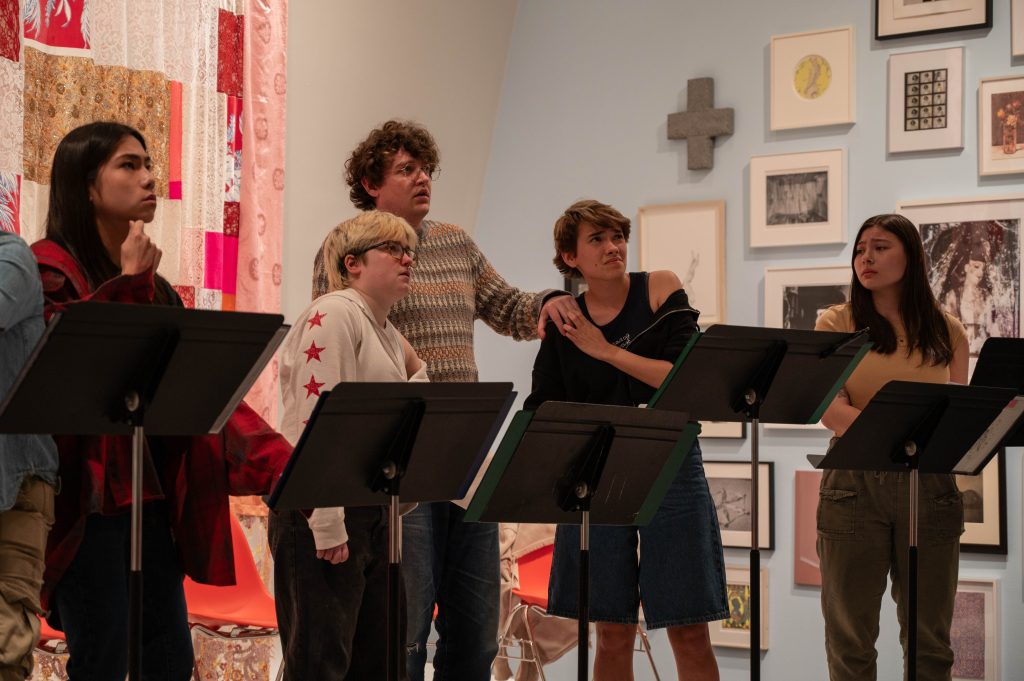
Joan, Curtis, and Franny confront Swampmom in the basement. Joan makes the executive decision that “they have to open her canal or she’s going to burst,” so the others retrieve the terror tots tools to perform the operation. While all of this is happening, Nate finds himself out in the field and faced with one final boss of a mom– but instead of the mom’s succeeding in manipulating him through the exploitation of his grief, this time he resists and takes control of the situation – which given how much control everyone else has throughout the play, feels utterly triumphant.
Back in the basement, Joan explains the lore of the basement to the others – when she and Nate were kids, one of the yearly floods opened a crack in the wall, a portal to hell, that might have been down here forever, and “once’s it’s inside you, it’s there.” Curtis and Nate join the fray in the basement just after Nate confesses his attraction to Curtis, but Franny is taken aback by their entrance because it means that Curtis has violated their trust by failing to keep the basement a secret.
Teeny and Jessica, the only two characters to have not yet joined the others, are upstairs, where Jessica has fully embraced roleplay with Teeny. When Teeny expresses that they’re still not sure how to properly be Evangeline, they let it slip that they asked for Joan for help previously – leading to Jessica losing their trust in Teeny, because Teeny (like Curtis and Franny) had promised to keep their conversations a secret. Jessica then threatens Teeny that she’ll tell their mom that they work at the haunt. After her threat, Jessica tries to leave, but cannot find the exit, and in an attempt to shove Teeny away, accidentally knocks them down the basement stairs.
Now, with everyone in the basement, the group descends into chaos. Nate is so shocked at the sight of Swampmom he mistakes her for part of the attraction, and in making this mistake, Nate admits that though he’s been having doubts about keeping the place, seeing everyone’s commitment makes it feel like it’s worth keeping.
When Nate realizes what is actually going on, panic ensues. Franny is alarmed over the prospect of the cops being called, while Nate considers using his baseball bat to attack the threatening Mom – who despite not doing anything to put them in harm’s way in this moment, represents something much larger to them and has thus become a threat. Curtis emerges as the voice of reason, explaining “as much as she wants us all dead, she is still a person, and we are people, and it’s as much about us as it is about her. Our humanity is affected by how we treat her.” It’s these moments of utter lucidity which remind audience that Hell is Real is not only a play which engages rich explorations of queerness, found family, and campy roleplay, but acknowledges all of these matters as deeply entangled with our humanity.
Joan channels a conversation between Nate and the spirit of his father to talk him down from doing anything violent to Swampmom, and as this happens, the others complete the operation, resulting in a gush of swamp water landing on the The Girl, which rebirths her as Jessica. Curtis and Nate kiss, and Jessica forgives Teeny. Wrapped in imagery of the natural world, Swampmom reawakens just as Mom, expressing concern for the blood on everyone around them, and then using the right pronouns for Teeny for the first time ever. “I’m sorry I tried to keep you small,” she tells Teeny, “I can’t believe how much time I wasted being afraid.”
In this image of unity amongst the whole cast, things seem to be looking up… until they are met with a huge eyeballing looming through the windows of the house, growing and growing. But despite the outside world just getting worse and worse, nothing changes that they all have each other, a testament to queer resilience and the value chosen families, however messy.
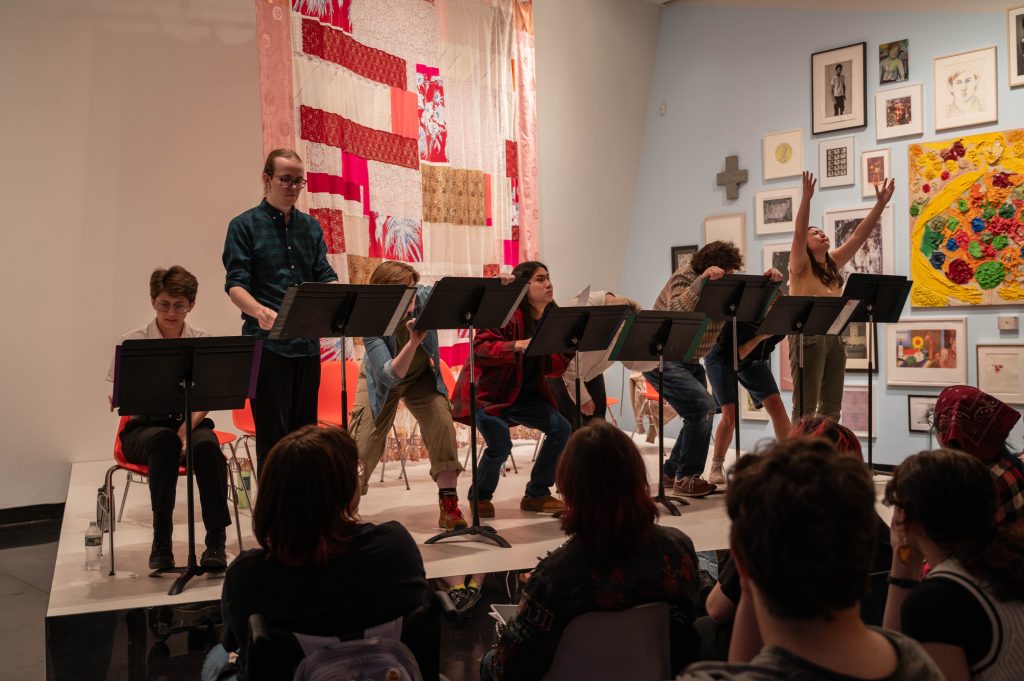
After the show, I hugged my friends shed some tears below the incredible mosaic of queer artwork up on the walls of the Tang. It’s a scary world out there, but nothing can change the weird tenderness of the worlds we hold within our chosen spaces, and the value of imagining things differently. With that imagination, it doesn’t matter if hell is real and busting down our door, figuratively or literally – we have the power to imagine and protect the worlds that bring us and our loved ones closer.
Photos by Logan Waugh ’26
***
Ellery Shea ’25 is a staff writer for the Skidmore Theater Living Newsletter
